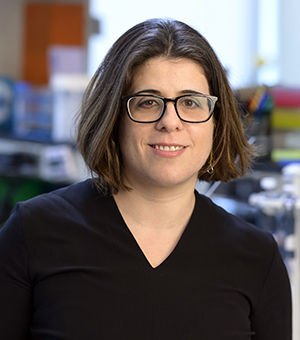Molecular biologist Agnel Sfeir, who holds the PaineWebber Chair in Cancer Genetics at the Sloan Kettering Institute, will deliver an Apex Lecture on Oct. 30 at 2:00 p.m. in 202 Light Hall. Her talk,“Two Genomes, One Balance: Mitochondrial and Nuclear DNA Stability”, will be followed by a reception in 618 Light Hall.
Sfeir investigates how DNA is broken and repaired and the relationship of these processes to aging, cancer, and other phenomena. One of her recent areas of interest is the biology of the DNA within mitochondria, which she refers to as “the forgotten yet fascinating genome.”

Sfeir’s research focuses on telomere maintenance, nuclear DNA repair, and mitochondrial DNA replication and repair. Projects in her lab address fundamental questions related to telomere maintenance and how telomere dysfunction impacts cancer. Sfeir also studies an ancient but error-prone DNA repair pathway called micro-homology mediated end-joining and focuses on polymerase theta—Polqa key enzyme underlying mutagenic repair. In addition, her lab investigates the replication and repair of mitochondrial genomes and explores mitochondrial-nuclear crosstalk in response to mitochondrial DNA stress.
Sfeir joined the Molecular Biology Program at the Sloan Kettering Institute in March 2021 after previously serving as a faculty member at the Skirball Institute of Biomolecular Medicine at New York University. Through her work, Sfeir aims to advance the understanding of fundamental biological mechanisms related to chromosome biology and how disruptions in these processes can contribute to disease. Her research at Sloan Kettering builds on her prior expertise and investigations in this field.
About the Apex Lecture Series
There are major inflection points in biomedical discovery that create new fields, new ideas, and new opportunities to impact human health. To engage with global researchers contributing to these inflection points, the Vanderbilt School of Medicine Basic Sciences launched the Apex Lecture Series in 2023. This school-wide seminar series brings scientists who are influencing the trajectory of their fields to engage with our scientific community on campus.
Lecture abstract
Eukaryotes cells contain two distinct genomes—nuclear and mitochondrial—with distinct evolutionary origins that are housed in separate environments. The interplay and coevolution of these genomes are crucial for maintaining cellular homeostasis. Perturbations to either genome can disrupt their crosstalk and affect cellular responses. I am fascinated by how cells manage these challenges to maintain the delicate balance of preserving genome stability while allowing genetic innovation.
Our research program revolves around two fundamental questions related to genome stability. Firstly, we investigate the evolutionary benefits of the microhomology-mediated end-joining repair pathway that fixes DNA breaks in the nuclear genome. Despite being widely conserved, MMEJ’s physiological role remains elusive. We aim to test the hypothesis that MMEJ balances genome integrity and evolution by promoting extrachromosomal DNA circularization. The circularization of invading DNA through MMEJ is a protective mechanism that shields the host genome. These circularized elements can resist nuclease degradation and persist in the nucleoplasm, providing a substrate for potential integration and stimulation of genome diversity.
In another line of inquiry, we explore how the nucleus manages perturbations to the mitochondrial genome. Aberrations in mitochondrial DNA profoundly impact cellular function. Yet, standard methods of assessing the extra-nuclear genome and efforts to study it in isolation fail to address fundamental questions about its instability. To tackle this, we will develop innovative genetic and molecular tools to investigate the outcome of three toxic mitochondrial DNA aberrations and determine how they alter mito-nuclear crosstalk.